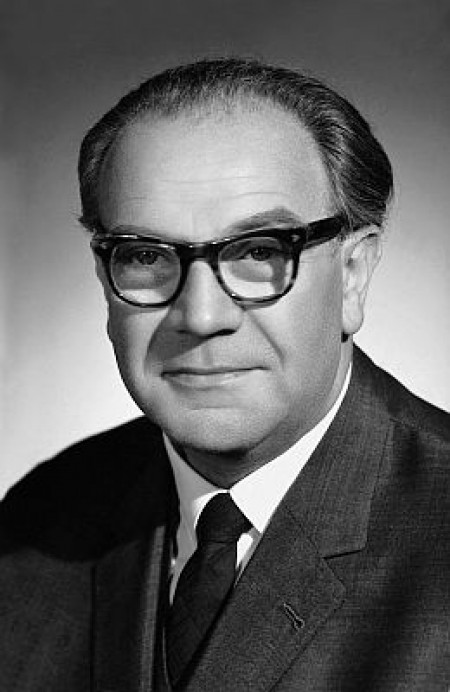
19 October 1913, Magyarszék – 27 December 1998, Budapest
A personal intonation is probably irrelevant here: the author of this article has been preserving the lasting experience of the first concert attendance in his life for six decades. It was in 1940 or 1941, at the Kis Filharmónia (Little Philharmonic)'s all-Mozart afternoon concert at the Great Hall of the Academy of Music, for high school students – I was not that yet. The program consisted of A Little Night Music, Exsultate jubilate and a Mozart-Canon by way of common singing. The Capital City Orchestra (National Philharmonic Orchestra today) was conducted by Miklós Forrai; the soprano soloist was the conductor's wife, the memorable Mária Gyurkovics.
Miklós Forrai studied piano and composition in the famous Városi Zenede (Town Music School) of Debrecen simultaneously with his eight years of high school studies. From 1931 he was a student of the Academy of Music, first with the trumpet as his major, then at the Sacred Music Department for two years, and later for one additional year as a Choral Conductor major at the department mentioned. He gained certificate as a public school class singing teacher, as well, and in 1935 Kodály accepted him to his composition class, immediately to the third academic year.
In 1934 (according to other sources in 1936) he founded a sixteen-member chamber choir named after him, that popularized the choral repertoire of the Renaissance at more than a hundred concerts and radio broadcasts until its being quit in 1948. Forrai led the first viable chamber choir in Hungary.
He joined the circle of Magyar Kórus (Hungarian Choir) music publisher through his professors (Lajos Bárdos, Artúr Harmath). He issued his handbook there titled Karvezető (Choral Conductor) in 1936, a collection of madrigals Fallalla in 1939, and the anthology Ezer év kórusa (Choral Works of a Thousand Years) in 1943. He was the regens chori of the Cistercian church at the Szent Imre herceg (today: Villányi) way for several years, and the president of the Society for the Certified Chapel Masters founded in 1936. He was the heart of the youth concerts called Kis Filharmónia organized under the auspices of Magyar Kórus. The model he formulated is still valid (oral explanation of the works, only entire works can be performed, single movements not, the concert should be concluded with common singing). From 1941 he had been teaching eleven courses at the Academy of Music for more than three decades, and was the head of the Vocal Department between 1957 and 1963.
He gathered enormous knowledge; it was not accidental that Bence Szablocsi chose him as a co-editor for his music history discs (Musica Hungarica 1965, Musica Mundana 1975). He was obsessed with work and had an excellent skill for organizing. Lajos Bárdos entrusted Miklós Forrai in 1948 worthily with the leading of the Budapesti Kórus (Budapest Choir) founded by Bárdos. The new conductor preserved the corporate identity of the excellent oratorio-choir amongst the storms of history throughout thirty years and became deservedly its life-conductor in 1978, when he put down his baton. His repertoire was spanned from Bach and Händel to the compositions of his Hungarian and foreign contemporaries. In spring of 1956 Forrai conducted the Hungarian premiere of Kodály's orchestral Missa brevis being finished for eight years by that time, and the domestic premiere of Honegger's oratorio Joan of Arc at the Stake in 1958. He was familiarizing with the music of Walton, Orff and with Hungarian oratorical compositions from Ferenc Farkas to Ferenc Szabó. He worked with Klemperer, Gui, Scherchen, Metha, and many excellent foreign conductors, primarily with Ferencsik of ours.
In 1973 the retired Miklós Forrai resurrected the dead Liszt Ferenc Society. Liszt's oratorical works were in the center of his repertoire until he conducted. The reorganization of the Society preserving his memory extended far beyond its own significance. The young party-state quitted all the civil organizations of music culture around 1948-1949, no matter how charitable activities they conducted; as the social formations where ‘four or five Hungarians were together' could not be controlled by the state. Professor Forrai established the Liszt Ferenc Society by overcoming huge resistance and led that as its General Secretary until his health made it possible. The international introduction of the Liszt Grand Prix du Disk, the boosting of research, as well as the acknowledgement of specific operational forms of the civil musician society is attached to his name.
The life and work of Miklós Forrai and his working capacity alloyed with knowledge is a life-Achievement and as that indelible from our history of music.
B. J.


